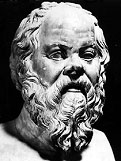![]()
![]()
Ancient Philosophy
Socrates - Apology
Primary Source:
- Plato, Apology from Baird and Kaufmann, Ancient Philosophy, pp. 88-105.
Secondary Source:
- Irwin, “Socrates’ Trial”, “Socrates’ Defense”, and “Socratic Arguments” from Classical Thought, pp. 68-75.
Background:
From John M. Cooper’s Routlegde Online Encyclopedia article on Socrates:
At the age of 70 Socrates was charged before an Athenian popular court with 'impiety' - with not believing in the Olympian gods and corrupting young men through his constant questioning of everything. He was found guilty and condemned to death. Plato's Apology, where Socrates gives a passionate defense of his life and philosophy, is one of the classics of Western literature.
Scholars sometimes mention specifically political motives of revenge, based on guilt by association: a number of prominent Athenians who were with Socrates as young men or were close friends did turn against the Athenian democracy and collaborated with the Spartans in their victory over Athens in the Peloponnesian War. But an amnesty passed by the restored democracy in 403 BC prohibited prosecution for political offences before that date. The rhetorician Polycrates included Socrates’ responsibility for these political crimes in his Accusation of Socrates, a rhetorical exercise written at least five years after Socrates’ death. But there is no evidence that, in contravention of the amnesty, Socrates’ actual accusers covertly attacked him, or his jurors condemned him, on that ground. The defenses Plato and Xenophon constructed for Socrates, each in his respective Apology, imply that it was his own questioning mind and what was perceived as the bad moral influence he had on his young men that led to his trial and condemnation.
Despite its impressiveness, Socrates’ speech failed to convince his jury of 501 male fellow citizens, and he died in the state prison by drinking hemlock as required by law. His speech evidently offended the majority of the jurors by its disdain for the charges and the proceedings; Xenophon explains his lofty behavior, which he thinks would otherwise have been lunatic – and damaging to his reputation – by reporting that he had told friends in advance that as a 70-year-old still in possession of his health and faculties it was time for him to die anyhow, before senility set in. Furthermore, his ‘divine sign’ - the ‘voice’ he sometimes heard warning him for his own good against a contemplated course of action – had prevented him from spending time crafting a defense speech. (This voice seems to have been the basis for the charge of introducing ‘new’ gods.) So he would do nothing to soften his manner in order to win his freedom. Even if this story is true, Plato could be right that Socrates put on a spirited, deeply serious defense of his life and beliefs – one that he thought should have convinced the jurors of his innocence, if only they had judged him intelligently and fairly.
Dialogue Outline and Questions:
- The Speech (17a – 35d)
- Introduction (17a – 18a)
- How does Socrates present himself to the jury
- Statement (18a – 19a)
- What two types of accusers does Socrates distinguish between?
- What are the various charges leveled against him?
- Refutation of the Old Accusers (19a – 24b)
- Does Socrates claim that he can teach virtue like Evenus? What does he say about such knowledge and ability?
- What is the story he tells of Chaerephon’s visit to Delphi?
- How does Socrates respond to the Oracle’s statement?
- Why does he learn from doing this?
- Why did this upset the Athenians?
- Refutation of Meletus (24b – 28a)
- What two arguments does Socrates make to demonstrate that he has not corrupted the youth?
- Instead of punishment, what does he claim he needs instead?
- What two arguments does Socrates make against the charge of impiety?
- Digression: Socrates’ Mission to Athens (28a – 32e)
- Why is Socrates risking his life by doing his questioning?
- Why does he believe his task is of vital importance to Athens?
- Why does he reject the “public life” and why does he bring this up?
- Socrates Refutes the Charges (32e – 34b)
- What does Socrates say about associates of his who did bad things?
- What do Socrates associates think of Socrates?
- Peroration (34b – 35d)
- Socrates notes that he could have done other things for his defense, but he didn’t. What are theses things and why didn’t he do them?
- Introduction (17a – 18a)
- The Counterpenalty (35e – 38b)
- Socrates is found guilty of the crimes. Under Athenian law, the prosecutor proposed a penalty, and the convicted defendant a counterpenalty; the jury was required to choose between them without alteration. The usual practice was for a convicted person to propose a penalty as heavy as he could bear short of that which the prosecutor demanded, in hope that the jury might accept it.
- What penalty does Socrates think he actually deserves? How is this a marvelous display of Socratic Irony?
- Why does he claim “the unexamined life is not for man worth living”?
- Epilogue (38c – 42a)
- The jury votes overwhelmingly for the death penalty.
- What does Socrates say to those who voted for his death?
- What does he say to those who voted for his acquittal?
I love Apache! So should you!
![]()



